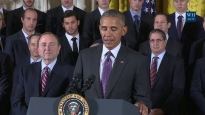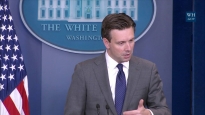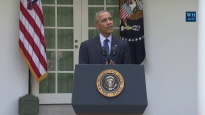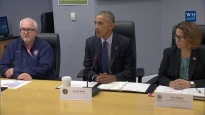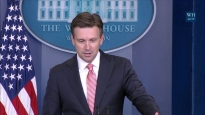Presidential Press Conference on Energy Prices and Supplies
March 11, 2011 | 48:42 | Public Domain
President Obama speaks to the press about his plan to address rising energy costs and ensure the country maintains its necessary supply of oil. The President also also takes questions from the press on Libya, the Middle East, the budget and the Japanese earthquake and tsunami.
President Obama Addresses the Budget in Today's Press Conference
While today's press conference focused on issues such as gas prices, President Obama did have a chance to share his thoughts about the continuing budget negotiations.
He started off by saying that it is "irresponsible" to "keep on running the government based on two-week extensions." And while he is confident that the process can be completed, he doesn't agree with some Republican proposals, such as cuts to Pell grants for students currently using them to pay for college.
The President also called out the use of riders - language about issues that don't impact the budget but have been added to proposed budget legislation - as an effort to "sneak political agendas into a budget debate."
Relevant parts are included below:
... with respect to the budget, I think it’s important to understand that right now the discussion is about last year’s business. We’re talking about how to fund the remainder of this fiscal year. This is an appropriations task. And we have been in very close contact with all members of Congress -- both parties. I’ve had conversations with Mr. McConnell, I’ve had conversations with Mr. Boehner, I’ve had conversations with Nancy Pelosi, and I’ve had conversations with Harry Reid about how they should approach this budget problem.Here’s what we know: The Republicans in the House passed a budget that has been now rejected in the Senate. They are not going to get 100 percent of what they want. The Democrats have put forward spending cuts, many of them pretty painful, that give Republicans already half of what they were seeking, because they’re the right thing to do. Many of those cuts are ones that were already embodied in the budget that I proposed for 2012. Now, that’s been rejected as well.So here’s what we know -- that both sides are going to have to sit down and compromise on prudent cuts somewhere between what the Republicans were seeking that’s now been rejected and what the Democrats had agreed to that has also been rejected. It shouldn’t be that complicated. And so what I’ve done is, every day I talk to my team, I give them instructions in terms of how they can participate in the negotiations, indicate what’s acceptable, indicate what’s not acceptable. And our expectation is, is that we should be able to get this completed.Now, because I think neither Democrats or Republicans were in the mood to compromise until their 100-percent maximal position was voted down in the Senate, we’ve probably lost some time. And we may not be able to fully resolve this and meet next week’s deadline for the continuing resolution, which means that there may be potentially one more short-term extension.But let me just make some broad points about this. Number one, we can’t keep on running the government based on two-week extensions. That’s irresponsible. We’ve got a war in Afghanistan going on. We’ve got a wide range of issues facing the country on a day-to-day basis. And the notion that we can’t get resolved last year’s budget in a sensible way with serious but prudent spending cuts I think defies common sense. So we should be able to get it done.Point number two. There are going to be certain things that House Republicans want that I will not accept. And the reason I won’t accept them is not because I don’t think we’ve got to cut the budget; we do. And we’ve already put forward significant cuts in the discretionary budget, some of which have not made members of my own party happy.But the notion that we would cut, for example, Pell Grants, when we know the single most important thing to our success as a nation long term is how well-educated our kids are, and the proposal that was coming out of the House would cut this year about $800 out of Pell Grants for 8 million kids, and if were extended into next year would cut in half the Pell Grants that they’re receiving -- that makes no sense. The notion that we would decide that, under the Republican budget proposal, to eliminate 200,000 Head Start slots that also would mean the layoffs of 55,000 teachers -- that doesn’t make sense.The principle that I’ve tried to put forward since the State of the Union is we’ve got to live within our means, we’ve got to get serious about managing our budget, but we can’t stop investing in our people. We can’t stop investing in research and development. We can’t stop investing in infrastructure -- those things that are going to make us competitive over the long term and will help us win the future.And so I’ve communicated directly to Speaker Boehner as well as to Republican Leader McConnell that we want to work with them to get to a sustainable discretionary budget. And we think it is important for us to stop funding programs that don’t work. But we’re going to make sure that we hold the line when it comes to some critical programs that are either going to help us out-educate, out-innovate, or out-build other countries.Last point I’ll make on the budget. The Republican budget that passed out of the House included a whole range of what are called riders. These aren’t really budget items. These are political statements. And I want -- I’ve said, again, directly to Speaker Boehner that we’re happy to discuss any of these riders, but my general view is, let’s not try to sneak political agendas into a budget debate. If Republicans are interested in social issues that they want to promote, they should put a bill on the floor of the House and promote it, have an up or down vote, send it over to the Senate. But don’t try to use the budget as a way to promote a political or ideological agenda.I think that’s the American people’s view as well. I think one of the messages that the American people have clearly sent is get serious about living within our means and managing our budget in a responsible way, and stop with the political bickering. And if we have that view in mind, then I think that not only can we get this short-term issue resolved, but I think we can actually solve the long-term budget issues as well.
And a little later he added:
The last point I’ll make on the economy overall relates back to the budget issues that we talked about. If you looked at the last jobs report, growth in the private sector -- very strong; 220,000 jobs created. Where you lost jobs was in state and local government. And that means teachers being laid off, firefighters being laid off, police officers being laid off. Now, we were able to cushion some of that over the first two years of this recession through the Recovery Act, and it made a huge difference all across the country. But now states are continuing to cut, local governments are continuing to cut.I think it’s very important, when we think about the budget, to understand that our long-term debt and deficits are not caused by us having Head Start teachers in the classroom. Our long-term debt and deficit are caused primarily by escalating health care costs that we see in Medicare and Medicaid that is putting huge pressure on the overall budget.And that’s why I think it’s going to be important for us to have a conversation after we get the short-term budget done about how do we really tackle the problem in a comprehensive way. And that means not just going after Head Start or Corporation for Public Broadcasting -- that’s not where the money is. What it means is, is that we’ve got to make sure that we’re tackling defense spending; we’re tackling tax expenditures and tax loopholes; that we’re tackling entitlements; and that we’re thinking about how do we really get our arms around those things that are driving the debt and deficit, in a serious way and in a bipartisan way.
|
October 6, 2016
|
October 6, 2016
|
October 6, 2016
|
October 5, 2016
|
|
October 5, 2016
|
October 5, 2016
|
October 5, 2016
|
October 4, 2016
|
- &lsaquo previous
- …
- 16
- 17
- 18
- 19
- 20
- 21
- 22
- 23
- 24
- …
- next &rsaquo
